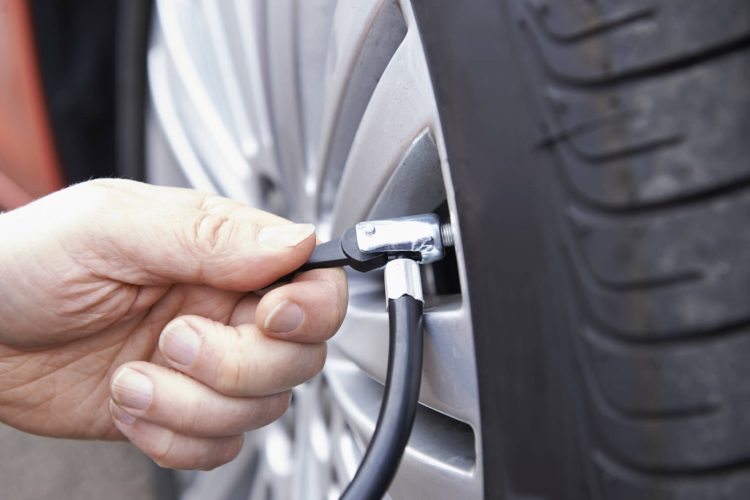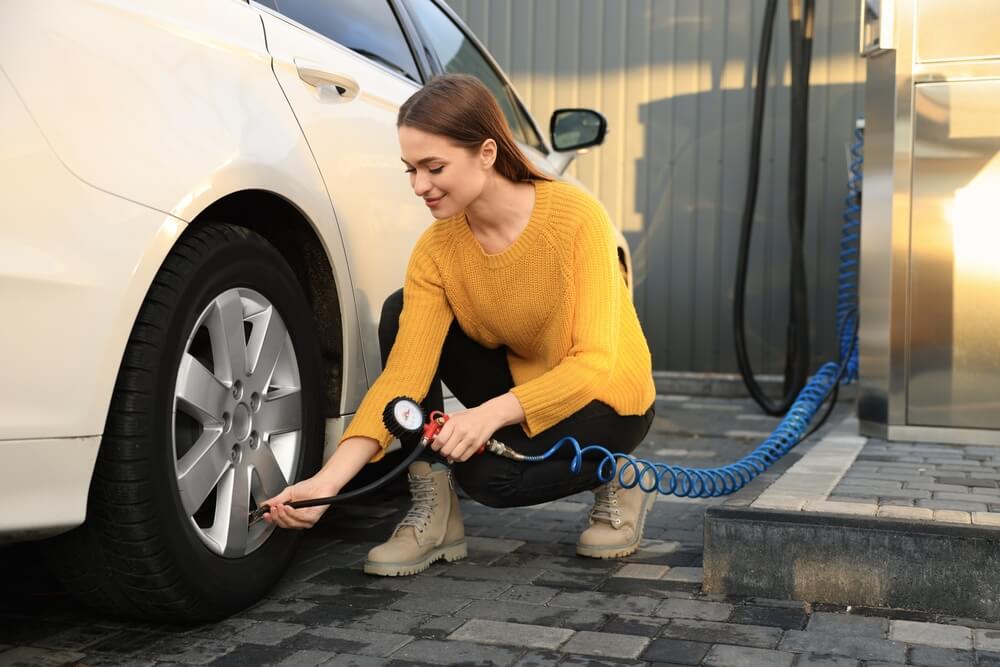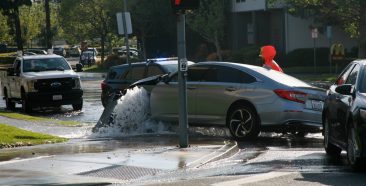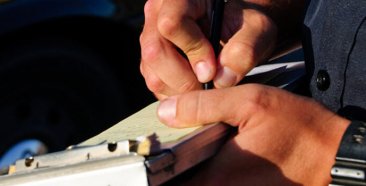
You may have heard that adding a bit of extra air to your tires is an easy way to save money on your gas costs. But, does over-inflating tires increase your gas mileage? There are some conflicting ideas about whether over-inflated tires can make a significant impact on your vehicle’s fuel efficiency. Although it’s possible that extra air could make a minor difference in gas mileage, it may not be worth the potential drawbacks.
Your car has plenty of ongoing expenses, from monthly auto insurance premiums to oil changes. As a result, it can be tempting to try out different hacks to save on your gas expenses. But if you’re looking for ways to save on your car’s maintenance expenses, it’s important to know the facts. Get started by learning about the relationship between tire pressure and fuel economy, reviewing the potential safety risks, and then exploring other tips for boosting your vehicle’s efficiency.
Understanding Tire Pressure and Its Role in Fuel Efficiency
Tire pressure refers to the amount of air you have in your car’s tires. It’s measured in pounds per square inch or PSI. Using a tire pressure gauge on a regular basis will help you to feel more comfortable with it. Each car has a recommended PSI to ensure your tires can properly support your car. Heavier vehicles usually have a higher PSI to support the extra weight, while lighter cars will have a lower PSI. Vehicle manufacturers calculate the suggested PSI for each car to give you the ideal balance of safety and efficiency while reducing unnecessary wear on your tires.
Your tire pressure actually does have a proven impact on your car’s fuel economy. If a tire is properly filled with air, your car should get slightly better gas mileage than if it’s under-inflated. This is mainly because of the shape of the tire. It is not the only thing you should consider. Your tire speed ratings are also important.
When your tires are fully inflated, they’re the ideal shape for rolling down the road. If they’re even a bit deflated, their shape can change slightly as they roll, which can take up more energy and make your vehicle less efficient. The increased surface area can also increase rolling resistance, which is the amount of energy it takes for your wheels to keep moving at a consistent speed. So, if one or more of your tires don’t have enough air, you’ll burn more gas than you would if they were all perfectly inflated.
The Theory Behind Over-Inflating Tires for Better Gas Mileage
You may think that because under-inflated tires are less efficient, over-inflated ones will be more efficient. Scientifically, this idea does have some merit. Over-inflated tires will bulge slightly in the middle, reducing rolling resistance and decreasing the amount of energy it takes to move your car down the road.
However, when it comes to real-world situations, the increase in fuel economy is usually negligible, and you’ll probably spend about the same amount on gas as you would with the proper PSI. While having a low PSI can have a major impact on your fuel efficiency, having a PSI that’s too high will make less of an influence. Additionally, any benefits can be outweighed by risks and potential safety issues.

Risks and Downsides of Over-Inflating Your Tires
Even if you can save a few cents on gas with over-inflated tires, there are several risks to keep in mind. Most experts and car manufacturers will recommend that you avoid over-inflation because of these issues. If you’re tempted to opt for a higher PSI next time you’re at the air pump, make sure you’re aware of the downsides.
Decreased Traction
The bulging shape of an over-filled tire means that less of your tire’s surface area is touching the road. This can decrease your traction, making it harder to maintain control of your vehicle. You may have trouble stopping suddenly or handling your car when the roads are wet and slick. Ultimately, the reduced traction can increase your risk of losing control of your car and getting into an accident.
More Wear and Tear
Your car’s ideal PSI is designed to extend the life of both your car and your tires. Overfilling your tires can cause uneven wear on the tread, so you’ll probably have to replace them more frequently. Additionally, over-inflated tires aren’t as good at absorbing shock as tires with the recommended PSI. Over time, this can wear out your suspension and mess with your car’s alignment.
Increased Risk of Blowouts
One of the biggest issues with over-inflated tires is the increased risk of a blowout. If your tires have more air than they can handle, they could burst unexpectedly from the extra pressure. A burst tire can cause you to spin out or experience other issues on the road, so over-inflating can ultimately pose a safety risk. One of the important things to learn about how to avoid car accidents is using proper tire pressure.
Finding the Optimal Tire Pressure for Fuel Efficiency
All in all, it’s best to keep your tire pressure at the suggested PSI to lower your gas costs without taking on unnecessary risks. Another item to consider when trying to save money is knowing the difference between premium and regular gas. But how do you know the right PSI for your vehicle?
Luckily, car manufacturers make it easy to find the recommended pressure for your car. Most vehicles have a sticker placed on your driver’s side door with a chart breaking down your ideal tire pressure. On some cars, the sticker might be located in the glove compartment or inside your fuel door. If you don’t have a sticker, you’ll probably be able to find the same details in your car’s owner’s manual.
The chart will tell you the recommended tire pressure for your front, back, and spare wheels. Although the PSI is often the same for all three categories, some cars may have slight differences between the front and back tires due to the weight distribution in the car.
Once you know your optimal PSI, check your tire pressure regularly as part of your tire care routine. Many modern cars have built-in sensors that will let you know the PSI of each individual tire, but you may need to use a separate tool if you have an older vehicle. It’s especially important to measure your PSI when it starts getting cold outside, as the change in temperature can quickly decrease your tire pressure.
Alternative Ways to Improve Gas Mileage Without Over-Inflating Tires
Even though over-inflating your tires isn’t a recommended method for lowering your gas costs, there are plenty of other ways to get the most out of your gas tank:
- Manage your speed: Does driving slower save gas mileage? Well, your car is most efficient at about 50 miles per hour. When you drive faster than that, your fuel economy starts decreasing. Keeping an eye on your speed is a simple way to get the most out of each gallon of gas.
- Avoid idling: Idling in your car burns unnecessary fuel. Whenever possible, instead of waiting around with the engine on, just turn off your car.
- Plan around traffic: Driving during high-traffic periods, such as rush hour, can cause you to spend time idling and wasting gas. If possible, try to drive during times when fewer people are out on the road.
- Maintain your vehicle: Maximize your overall efficiency by resolving engine issues, filling up your tank before it gets low, and, of course, keeping your tires at the optimal pressure.
Looking for Further Ways to Save? Save on Insurance Premiums with Freeway Insurance
At Freeway Insurance, you can save on more than just gas. You can lower your insurance costs by comparing rates with Freeway to find the best deal in your area. Our Freeway Insurance team can also connect you with several discounts to help you maximize your savings, so you won’t have to worry about costs at the pump. Start looking for deals by reaching out to your neighborhood Freeway Insurance location, getting a free quote online, or giving us a call at 800-777-5620.



